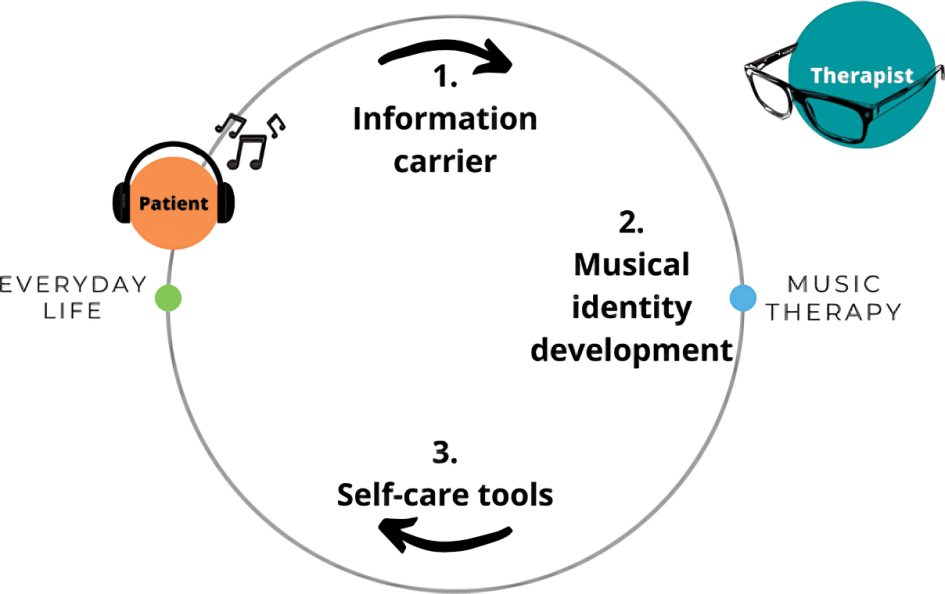
“
Music therapy for emotional health is an increasingly popular and effective method to support emotional well-being. It combines the power of music with therapeutic practices, promoting mental clarity, stress relief, and emotional balance. In this post, we'll explore 20 fascinating facts about how music therapy can benefit emotional health.1
1
”
Music therapy has been shown to significantly reduce anxiety and stress levels by lowering cortisol, a hormone associated with stress, making it a powerful tool for emotional regulation and mental relaxation.1
People with depression often experience a notable improvement in mood after engaging in music therapy, as music activates brain regions linked to emotion, facilitating emotional release and increasing serotonin levels, a mood stabilizer.2
Research shows that listening to preferred music during therapy can enhance positive feelings, lower negative emotions, and create a sense of calm, helping individuals build emotional resilience over time.3

Active participation in music therapy helps individuals develop a sense of accomplishment and self-worth. Creating and performing music can improve self-confidence, especially for those with emotional challenges.
Music therapy has been shown to improve cognitive function and emotional regulation in elderly patients suffering from dementia, enhancing their ability to recall memories and engage with others in a positive and emotionally fulfilling way.4
Group music therapy sessions encourage emotional support from peers, providing a collective environment where participants feel understood and validated. This sense of belonging promotes emotional healing and self-acceptance.5
Music therapy can also help in managing chronic pain by diverting attention from discomfort, reducing the emotional distress that often accompanies long-term physical ailments, and promoting relaxation through calming, rhythmic sounds.6
The rhythmic components of music therapy help regulate the autonomic nervous system, fostering balance between the body’s stress responses and relaxation, which contributes significantly to emotional calmness and overall health.7
Research has demonstrated that music therapy can reduce symptoms of post-traumatic stress disorder (PTSD) by helping individuals process difficult memories and emotions in a supportive, non-verbal, and less confrontational manner.8
Music has the power to help individuals connect with their feelings, enabling a deeper understanding of emotions and how to manage them. This fosters emotional intelligence, which is essential for emotional well-being and resilience.9

Music therapy enhances emotional expression in children and adults who struggle to communicate their feelings verbally, providing them with a means to express themselves and process their emotions creatively.
For individuals coping with grief, music therapy helps them navigate the grieving process by providing an outlet for sorrow and offering a medium for reflection, ultimately fostering emotional acceptance and healing. 10
Personalized music therapy, where the therapist chooses music tailored to the individual’s preferences, enhances therapeutic outcomes by promoting a stronger emotional connection to the session, helping the person process emotions.11
Incorporating music therapy into mental health care can complement other forms of therapy, such as talk therapy or medication, providing a holistic approach to treating emotional issues by addressing both mind and body. 12

Music therapy can lower symptoms of social anxiety by providing a non-threatening context in which individuals can express themselves and interact with others, reducing fear and building social confidence over time.
Studies suggest that listening to soothing music before stressful events, such as public speaking, can regulate emotions and improve performance by reducing anxiety and increasing a sense of control and preparedness.13
Music therapy encourages mindfulness by directing the mind's attention to the present moment. This focus on the here and now helps individuals manage overwhelming emotions, promoting peace and emotional balance.14
The power of music to evoke memory and emotion is used in therapy for individuals with emotional and cognitive impairments, such as stroke survivors, helping them reconnect with lost memories and emotional responses.15
Music therapy can significantly improve sleep patterns, as it lowers stress levels and promotes a calm, restful state, which in turn enhances emotional stability and mental health.16
Music, by nature, has a universal ability to resonate with human emotions. It creates a therapeutic space for emotional healing, offering both a comforting escape and a powerful means to address emotional struggles.17


